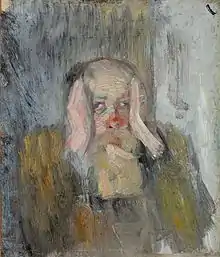veisalgia
English
WOTD – 23 May 2018
Etymology

Christian Krohg, Dagen Derpå, Selvportræt (The Day After, Self-portrait, 1883).[1] The painting depicts a man suffering from veisalgia.
From Norwegian kveis (“uneasiness after debauchery”) + -algia (“suffix meaning ‘pain, suffering’”) (from New Latin -algia, from Ancient Greek ἄλγος (álgos, “pain”)), coined as a medical term by Jeffrey G. Wiese, Michael G. Shlipak, and Warren S. Browner in a 2000 article published in the Annals of Internal Medicine (see the quotation).[2]
Pronunciation
- (Received Pronunciation, General American) IPA(key): /veɪsˈæl.d͡ʒɪ.ə/
Audio (Southern England) (file) - Hyphenation: veis‧al‧gia
Noun
veisalgia (uncountable)
- (medicine) The unpleasant after-effects of the consumption of alcohol; a hangover. [from 2000]
- Synonym: hangover
- 2000 June 6, Jeffrey G. Wiese, Michael G. Shlipak, Warren S. Browner, “The Alcohol Hangover”, in Annals of Internal Medicine, volume 132, number 11, , pages 897–902:
- There is no consensus definition of veisalgia ("alcohol hangover," from the Norwegian kveis, or "uneasiness following debauchery," and the Greek algia, or "pain"). Most descriptive and experimental studies have identified a set of common symptoms: headache, diarrhea, anorexia, tremulousness, fatigue, and nausea […]. Perhaps the most alarming feature of veisalgia is its high prevalence. In a study of college students, 25% of students reported experiencing a hangover in the previous week and 29% reported losing school time for hangover recovery.
- 2005, Judith C. Ahronheim, Zheng-Bo Huang, Vincent Yen, Christina M. Davitt, David Barile, “Case 27: Headache”, in Case Studies in Geriatrics, Cambridge: Cambridge University Press, →ISBN, page 182:
- Ms. J may be caught in the vicious cycle of headache related to a hangover, drinking more to relieve the headache and tremor (perceived as anxiety), daytime sleeping, and using the alcohol to try and induce sleep at night. The tremulousness, which the patient experiences as anxiety, is also part of the veisalgia syndrome.
- 2011, Nischita K. Reddy, Ashwani Singal, Don W. Powell, “Alcohol-related Diarrhea”, in Stefano Guandalini, Haleh Vaziri, editors, Diarrhea: Diagnostic and Therapeutic Advances (Clinical Gastroenterology), New York, N.Y., Dordrecht: Humana Press, , →ISBN, page 385:
- Patients with alcohol hangover or veisalgia (from the Norwegian kveis or "uneasiness following debauchery" and the Greek algia or "pain") suffer from fatigue, insomnia, diarrhea, headaches, dry mouth, malaise, and nausea in addition to autonomic hyperactivity (tremor, sweating, tachycardia, and hypertension) […].
Synonyms
Translations
unpleasant after-effects of the consumption of alcohol — see hangover
References
- From the collection of the Anchers Hus in Skagen, Denmark.
- See also Bill Casselman (2010) Where a Dobdob Meets a Dikdik: A Word Lover’s Guide to the Weirdest, Wackiest, and Wonkiest Lexical Gems, Cincinnati, Oh.: F+W Media, →ISBN:
- Veisalgia is a hangover. The neology was coined in an article by Jeffrey G. Wiese, Michael G. Shlipak, and Warren S. Browner in the professional journal Annals of Internal Medicine, June 6, 2000, vol. 132, no. 11, pp. 897–902. Seven years after its initial use, veisalgia is fairly widely used in popular medical websites and household medical advice books. It is not yet listed in the Oxford English Dictionary online and has met a modicum of resistance from academic doctors and journal, principally, I suspect, because the word is a hybrid, that is, not made from all Latin or all Greek word roots.
Spanish
This article is issued from Wiktionary. The text is licensed under Creative Commons - Attribution - Sharealike. Additional terms may apply for the media files.